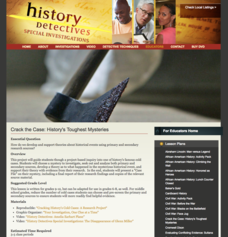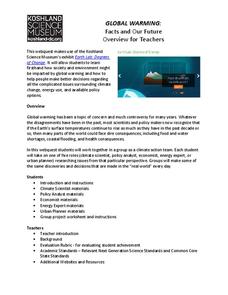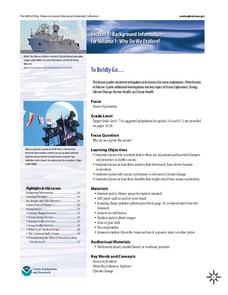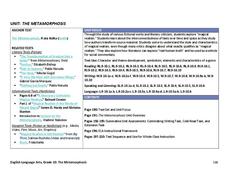PBS
Master of the Airwaves: How FDR Used Radio to Ease the Public’s Fears
The political and economic climate during the 1930's was uncertain and tumultuous. But Americans' minds and hearts were eased with the reassuring words of their president, Franklin D. Roosevelt, and addresses over the radio. High...
Beacon Press
A Time to Break Silence
Encourage teenagers to get involved in ending violence among young people. A Common Core-aligned resource and curriculum guide, designed to be used with a reading of A Time to Break Silence: The Essential Works of Martin Luther King,...
Royal Society of Chemistry
Equilibria—Gifted and Talented Chemistry
Teaching is a balancing act! Keep things on an even keel with a comprehensive equilibrium lesson plan. The resource covers reversible and irreversible reactions, Le Chatelier's Principle, and the industrial applications of equilibrium...
PBS
Crack the Case: History's Toughest Mysteries
Young sleuths don their trench coats, tip their fedoras, and grab their notepads to investigate one of four famous unsolved mysteries. After examining multiple primary and secondary sources related to their cold case, they propose a...
Scholastic
Prescription Pain Medication: What You Need to Know
The national epidemic of opioid addiction is making its way into high school populations. Educate the students in your class about the ways prescription opioids can both block pain and deliver large amounts of dopamine that make it very...
American Battle Monuments Commission
Ypres-Lys Offensive
The end of World War I saw an Allied victory, thanks in large part to the 1918 Ypres-Lys Campaign in Belgium. Middle and high schoolers learn more about the tactical decisions and military strategies of these important months during the...
Channel Islands Film
Island Rotation: Lesson Plan 3
How far have California's Channel islands moved? What was the rate of this movement? Class members first examine data that shows the age of the Hawaiian island chain and the average speed of the Pacific Plate. They then watch West of the...
American Battle Monuments Commission
Americans in Great Britain: 1942-1945
Watch the pivotal moments of America's presence in embattled Britain during World War II with an exceptional interactive tool. From personal stories about life on the front lines to a map that tracks every group and division throughout...
American Battle Monuments Commission
Entering Italy: The Naples-Foggia Campaign
The second half of 1943 found Allied soldiers struggling to separate Italy from the Axis Alliance and to solidify the new Italian government under Prime Minister Pietro Badoglio. High schoolers take a deeper look at the intricacies of...
National Academy of Sciences
Global Warming: Facts and Our Future
According to the United Nations, climate change affects every country on the planet. This research project encourages scholars to explore the factors that affect climate change from different perspectives: climate scientist, policy...
NOAA
I Can't Breathe!
The Gulf of Mexico dead zone, an area of low oxygen that kills marine life, costs the United States $82 million every year. Young scientists research anoxic ocean environments then come up with a hypothesis for the cause of the Gulf of...
American Physiological Society
Effects of Environment on Enzymes
Much like the tale of Humpty Dumpty, proteins, once altered, will never be the same again. Honors and pre-AP biology classes explore the delicate world of enzymes via a Webquest and lab experiment. The teacher's guide contains all...
NOAA
To Boldly Go...
When we think of ocean exploration, many of us have visions of sunken pirate ships full of treasure or mysterious creatures of the deep. What really motivates deep-sea investigation? The first in a series of diverse six-part lessons...
University of Minnesota
Mirroring Emotions
Do you ever give your class the "teacher look"? Without saying a word, they become silent and engaged (hopefully). How do they know what you're thinking? Explore the concept of nonverbal communication and how it relates to our mirror...
American Physiological Society
Sticky Adaptations A Lesson on Natural Selection
Now you see it, now you don't! The stick bug exhibits the ability to disappear into a wooded environment. Why does this adaptation manifest in some species, but not in others? Life science students explore animal adaptations in nature...
NOAA
Watch the Screen!
Can a sponge cure cancer? Life science pupils visit the drugstore under the sea in the fifth lesson of six. Working groups research the topic then get hands-on experience by testing the inhibiting effects of several plant extracts on E....
NOAA
What's the Big Deal?
Who knew that a possible answer to Earth's energy resource problems was lurking deep beneath the ocean's surface? Part four of a six-part series introduces Earth Science pupils to methane hydrate, a waste product of methanogens. After...
Advocates for Human Rights
The Rights of the Child
Don't be fooled by the size of the resource: these few pages provide the blueprint for a substantial, thoughtful unit on children's rights and the different philosophies and approaches that the United States and other countries have...
Carolina K-12
Preventing Voter Fraud or Encouraging Voter Suppression?
The issues of voter fraud and voter suppression are relevant in every election, local as well as national. Soon-to-be voters learn about a recent bill proposed in North Carolina, the Voter Information and Verification Act, and decide for...
Advocates for Human Rights
A Teaching Guide on Local and Global Transitional Justice
The Road to Peace introduces learners to the concept of transitional justice, a process where nations examine the causes of conflict, identify abuses, and use this information to develop a plan to transition to a society that upholds...
Pulitzer Center
Facing Risk: Journalists and their Families
Facing Risk is a powerful film that urges journalists who are committed to reporting from the world's hotspots to engage in difficult but essential conversations with their families before leaving on assignment. Interviews with kidnapped...
Cornell University
Shedding a "Little" Light on Cancer Surgery
Many types of cancer treatments now depend on nanotechnology—a big "little" discovery. Scholars begin by removing "malignant" tissue from simulated brains, one using fluorescent markers thanks to nanotechnology and one without. This...
Louisiana Department of Education
The Metamorphosis
How can something be true even if it didn't happen? Invite your classes to investigate the truths found in the world of magical realism as they analyze short stories, poems, informational texts, video, and art from this genre.
National Wildlife Federation
The Tide is High, but I’m Holding On… Using ICESat Data to Investigate Sea Level Rise
Based on the rate of melting observed from 2003-2007 in Greenland, it would take less than 10 minutes to fill the Dallas Cowboys' Stadium. The 17th lesson plan in a series of 21 has scholars use the ICESat data to understand the ice mass...

























